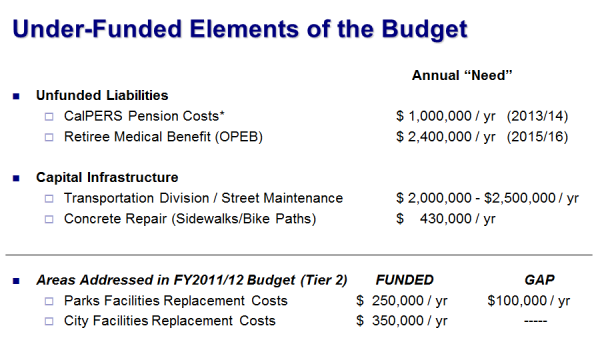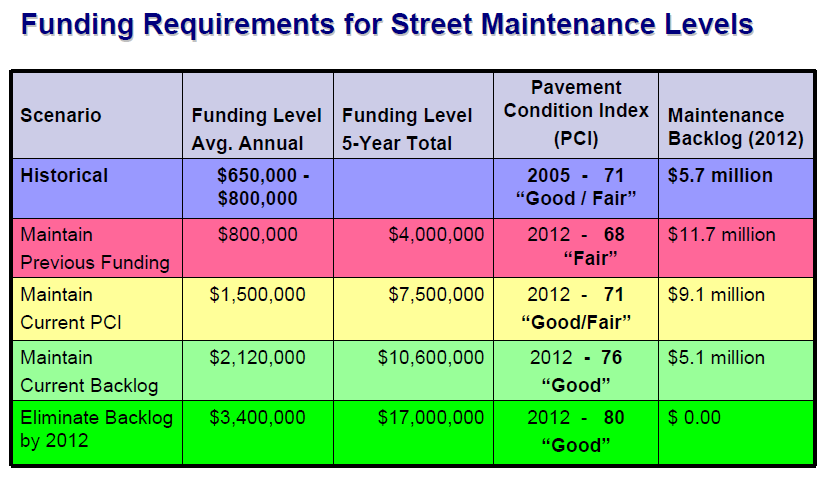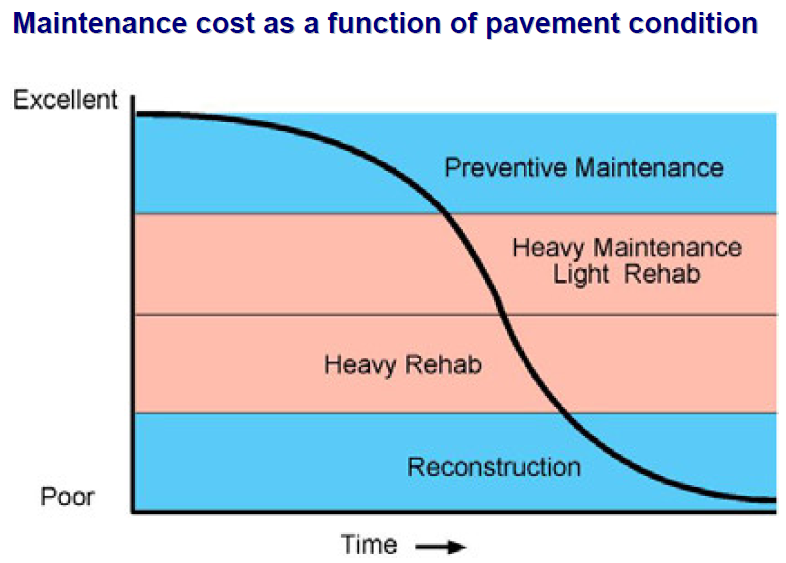 I remember the first time I saw the road maintenance report. It was a few years ago, but it was an eye-opener precisely because no one was talking about it. There is often a disconnect, I think, when we bring this topic up. Overall right now, the roads in Davis are okay, but they are a veritable patchwork – with the main thoroughfares utilizing the bulk of the funding and the side streets wearing and tearing.
I remember the first time I saw the road maintenance report. It was a few years ago, but it was an eye-opener precisely because no one was talking about it. There is often a disconnect, I think, when we bring this topic up. Overall right now, the roads in Davis are okay, but they are a veritable patchwork – with the main thoroughfares utilizing the bulk of the funding and the side streets wearing and tearing.
But what we need to understand is that last year’s report showed that the city had a baseline funding shortfall of $1.62 million. In the past, the city has relied heavily on one-time funding over the past two years from Proposition 1B and Federal Stimulus funding. However, that money is gone and those funding sources are gone with them.
Historically we have funded our streets at about a $650,000 to $800,000 level. However, that level of funding is not sufficient and at $800,000, we would achieve a rating by next year of 68, which is actually worse than it sounds and there would be an $11.7 million maintenance backlog.
Last year’s budget contained initially no funding for roads. That was augmented to about $400,000 before the $2.5 million budgetary shift from personnel kicked in that would have bumped the number up to $1 million.
But we are not at $1 million right now.
Paul Navazio, the city’s finance director, told the Vanguard in January that through various mid-year re-organizations and reductions, they are expected to realize an annualized savings of $1.7 million from the all-funds budget, with the general fund savings that are expected to be around $400,000.
That is well short of the $2.5 million and the indication is that there will be no new street repair contracts for this year.
How bad are things?
In a September report to council, Steve Pinkerton presented a variety of gaps in the funding. Much of that focus, and rightly so, has been on PERS and OPEB. But the capital infrastructure gap should be more alarming than it is.
How bad is the gap? The gap itself in street maintenance is about $2 million to $2.5 million. We have historically funded street maintenance at about $800,000. This year, that number will be far lower. We need about $2.8 to $3.2 million.
That does not include the amount of money for bike paths and sidewalks, some of which have been shut down because of lack of funding.
As Mr. Pinkerton pointed out, there is an expensive obligation down the road to maintain the city’s huge network of streets.
https://davisvanguard.org/images/stories/Sept-Budget-3.png
The cited infrastructure gap of $2 million to $2.5 million also includes the backlog of $10 to $15 million.
Mr. Pinkerton also talks about sidewalks and the fact that many cities are now starting to do street sidewalk maintenance as a shared obligation between the city and residents, and in some cases even a private one.
The problem the city faces here is the loss of transportation funding from the federal government, and Mr. Pinkerton does not expect that will return any time soon. He said that we have to assume that the federal government will not provide us with additional dollars.
Rochelle Swanson argued back in September that, even if we go up to one million, we are still growing the backlog, falling further behind. Time is of the essence on some of these, she argued.
She pointed out that deferred maintenance increases the costs of repair by as much as 5 to 10 percent per year.
As Mr. Navazio pointed out, the city’s needs exceed the $2.5 million in savings proposed in this fiscal year, and additional savings will be needed in the outyears.
Some have argued that this point is overblown. That the streets are not in horrific shape and that the standard is simply too high.
The problem with that view is they are missing the pernicious nature of deferred maintenance. It takes a certain level of spending to maintain the current conditions of our roads. Staff in the past has estimated that level to be around $1.2 million per year. The problem that we face is that we are only funding at $800,000 traditionally, and this year bumping it up to $1 million.
Therefore, at current levels of spending, the condition of the roads is going to decline.
At $800,000, by this year, we were projected to fall from our typical 71 pavement index rating to 68, which would be in the fair range, with a maintenance backlog this year of nearly $12 million.
But, in fact, it is a good deal worse than just that. Because, as we fall further behind in maintaining our baseline, the costs go up. So, rather than spending $1.2 million to maintain, that price will go up as well as the deferred maintenance budget.
Therefore, while last year they were talking $12 million in deferred maintenance, now the number being thrown around is $15 to $20 million.
This chart shows the problem:
The cost of preventative maintenance is far cheaper than the costs of light rehab, heavy rehab or outright reconstruction. As we delay, with the normal passage of time, the road quality declines and the need for intervention increases, as do the costs.
So yes, it is entirely possible and indeed likely that the streets are not in horrific condition at present, but I think it is a mistake to assume that, because we have high standards, the unmet street maintenance repair bill will not be as high in actuality as is projected.
We hear a lot of talk about public safety, but how safe is the public if we cannot do basic road repair? How is the city going to be able to afford what is approaching $20 million in deferred maintenance on roads?
In fact, this is becoming a crisis. The city for years has deferred maintenance not only on roads but other infrastructure. Just as the city has unfunded liabilities for retirement, the city has been able to avoid having imbalanced budgets by sticking infrastructure projects into unmet needs categories.
But just like compensation, these costs are going to come due and when they do, they will suck up general fund monies that used to go to programs, services, and yes, employee compensation.
—David M. Greenwald reporting




[quote]Mr. Pinkerton also talks about sidewalks and the fact that many cities are now starting to do street sidewalk maintenance as a shared obligation between the city and residents, and in some cases even a private one.[/quote]
Is this a harbinger of things to come? That residents will have to start taking care of the sidewalks in front of their houses?
I’ve noticed the general deterioration of our streets and highways everywhere. Potholes abound, and are not getting filled in or filled in at much slower paces. Street resurfacing is almost nonexistent. I suspect this is also a harbinger of things to come…
“Is this a harbinger of things to come? That residents will have to start taking care of the sidewalks in front of their houses?”
When I lived in San Mateo we had to pay for sidewalk repairs. If I remember right we were told that as homeowners we could be held liable if someone hurt themselves on a faulty sidewalk in front of our house.
Elaine and rusty49
I think you two are asking the right question without bringing up the underlying philosophical concern. As a community, how much do we want to pay in taxes and anticipate that our city will provide necessary services and accept risk for the quality of the work done? How much do we want to pay directly out of our own pockets to individual contractors to maintain our sidewalks, and how much would we be willing to spend on insurance or complicated litigation in case faulty work that we had commissioned resulted in injury ?
This might be another consideration to tack onto Rich’s question for the candidates.
I recommend the following…
For every encountered pothole, cracked and uneven sidewalk, overgrown or dead foliage on public paths and parks… think about that lucky 53 year-old person vacationing in Cancun after having retired from his highly-compensated government job at age 55… and consider how your worldview might have served to benefit this retired government worker at the expense of being able to afford public maintenance.
I think the public employee unions might start conceding when their members start raising enough complaints about the potholes doing damage to their BMWs and Corvettes.
[quote]I recommend the following…
For every encountered pothole, cracked and uneven sidewalk, overgrown or dead foliage on public paths and parks… think about that lucky 53 year-old person vacationing in Cancun after having retired from his highly-compensated government job at age 55… and consider how your worldview might have served to benefit this retired government worker at the expense of being able to afford public maintenance.
I think the public employee unions might start conceding when their members start raising enough complaints about the potholes doing damage to their BMWs and Corvettes.[/quote]
Unsubstantiated, over-generalized, and stereotypical as usual Mr. Boone.But I’ve come to expect nothing less from you. Yeah, you’re right. All of those Davis city employee’s making 45,000 a year or less just waiting to cash in on that huge pension to cash in on when they reach 55 which many will only have to work for the city for 40 years to get 100% of. Yep, that’s sure gonna buy them a lot of BMW’s and trips to Cancun. You’re opinionated remarks are just that, opinions and nothing more. Too bade they’re overly exaggerated and meritless.It’s that same kind of mentality that brought us such great hits as sexism, ageism, and racism.
Obviously he is not referring to those making $45,000. He probably is referring to the nearly 100 making $90,000 or more.
Couple of typos “bad” not “bade” and I actually meant to put $49,000 or less as in under 50K a year.
Sequoia, you are correct that I was generalizing and using hyperbole… the same thing you are doing relating my comments to “sexism, ageism and racism”. As an aside, I am impressed how creative you are at pulling the gender and race card on me. The ageism card is problematic though because I started getting AARP letter in the mail a while ago.
David is correct too, that I was talking about the population of government workers making over six figures in total compensation.
We need to give more serious consideration to this problem. Democrats control all the state political strings and many of the local political strings too. And these state and local politician puppet-masters are largely controlled by the union puppet masters.
The defensive branding campaign from the unions has been a good one… I think your comments provide a good example of how effective it has been. They have used empathy for the little guy as a smoke screen to protect pay and benefits for the more powerful and influential members. When we talk about teacher pay, it is the children we are attacking. When we talk about public safety employees, it is the victims of tragedy we are attacking. When we talk about the high pay to government administrators and professionals, it is janitors and park maintenance workers we are attacking. See how that works?
The problem is that it has only worked for the unions. It has done so at the expense of the tax-paying public and citizens reliant on services being cut to sustain the pay and benefits of the unions.
There is absolutely no reason that a firefighter with a high school education should be making over six figures and retire at age 50 or 55 with 90% of his pay and 100% of his healthcare paid for the rest of his life and his spouse’s life. It may make us feel all warm and fuzzy inside to provide such a rich life to a public servant, but it is completely unsustainable.
We are screwed unless we stop playing political games with this as start doing real math.
I was surprised some years ago when Bill Emlen told me that the city pays the bill for sidewalk repairs. A few years before Bill told me that, a friend of mine who was then making his living flipping houses in Sacramento told me he had to pay the bill to repair broken sidewalks around his house which had been damaged by the roots of the city’s street trees.
I could live with a change in Davis to require property owners to pay for repairs to the sidewalks on their properties. However, I think a fairer system would be to reasonably guess as to why the sidewalk is damaged and assign costs of repair based on reasonable blame.
The worst sidewalk I know of in Davis is the sidewalk out front of the Davis Parent Nursery School on West 8th Street. Why is it so broken up? Because the curb was never cut like a driveway, and cars drive over the sidewalk all day long to park in front of DPNS. In a case like that, I would assign all of the blame to DPNS and require them to fix the sidewalk (and include a curb cut so the damage will not return so quickly in the future).
In a case, however, where city crews or a utility crew caused the problem, the property owner should not be held responsible for any of the cost. I more-less feel the same way when a city-required street tree’s roots lifts up the sidewalk. That cost should probably be borne entirely (or maybe 80%?) by the city.
[i]”Unsubstantiated, over-generalized, and stereotypical as usual Mr. Boone.But I’ve come to expect nothing less from you.”[/i]
Why are you such an as$hole?
Jeff has replied effectively, but I’d like to ask everyone to avoid personal characterization of other blog participants.
You can delete my post about Sequoia and this one, too, for that matter. However, I think Sequoia’s personal attack on Jeff Boone was uncalled for and mean-spirited and especially wrong since Sequoia hides behind a pseudonym. But … I’ve had my run. I’ve calmed down.
[quote]There is absolutely no reason that a firefighter with a high school education[/quote]My understanding is that nearly all firefighters have to have 2+ years [@ least at Community college level, in a related curriculum] to successfully be hired by the City. I won’t comment on the balance of his comments, but I find it interesting that engineers, who are required to have a 4 year degree, often required to have professional licenses from the State, make significantly less than a Firefighter, years of experience being equal. The engineers are the ones [along with the maintenance folks they support] charged with making sure that the water distribution system, including hydrants, mains, etc., are sufficient for the firefighters to do their jobs.
[i]”My understanding is that nearly all firefighters have to have 2+ years at least at Community college level …”[/i]
Here is what I found ([url]http://education-portal.com/fire_fighter_education.html[/url]) about this question, though perhaps it does not apply to Davis: [quote] A career as a fire fighter [b]doesn’t necessarily require formal education beyond a high school diploma or a GED[/b]; however, it may lead to increased employment opportunities and career advancement. Regardless of an individual’s educational experience, a fire fighter’s training primarily takes place on the job. Applicants are expected to pass written, physical and medical examinations prior to being considered for a job opening.
Once they are hired, new recruits participate in vigorous physical training exercises before they are permitted to enter the field. Nearly all fire fighters in the United States must be certified as emergency medical technicians (EMTs) before being allowed in the field. This training can take up to one year to complete and also results in EMT-Basic certification.
Certificates, associate’s degrees and bachelor’s degrees in fire science are widely available at vocational colleges and 4-year universities. Many of these programs are administered by fire academies, which are associated with both a school and the local fire department.
Students in a fire science program study various fire investigation methods as well as techniques for controlling a fire with equipment, like axes, fire extinguishers, ladders and chainsaws. These programs also typically include instruction in fire prevention and teaching fire safety to the public. Additionally, fire science students are taught basic first aid, CPR and proper handling of hazardous materials. [/quote] FWIW, a good friend of mine from college, who earned his BA degree at UCSB and then played pro baseball for 8 years, became a firefighter for LA County and now is an arson investigator, also for LA County. I’ve never really asked if many of his colleagues went to college. I recall him saying, though, that a lot of firefighters have military experience before getting hired, and many of them are trained as firefighter specialists in the military.
Umm Jeff, for the record I don’t believe I actually accused you of racism, sexism, or ageism, nor did I call you a racist, sexist or ageist. I’m not playing any cards here. I simply said that the practice of and mentality behind of stereotyping is one of the underlying foundations that brought us those things. Stereotyping is nothing more than a crutch for lazy and/or weak minds. To make blanket statements like you did give the illusion that all government workers are taking are living and retiring fat on the hog of the taxpayer dollar. A point which I would gladly argue with you to the ends of the earth. I would suggest that they are in the minority while at the same time that minority comprises most if not all of the problem.